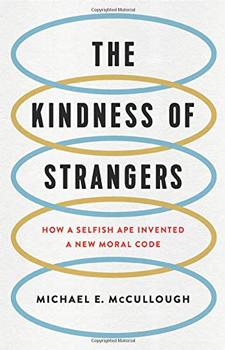Summary | Excerpt | Reviews | Beyond the Book | Readalikes | Genres & Themes | Author Bio

 Book Reviewed by:
Book Reviewed by:
Grace Graham-Taylor
Buy This Book
Among modern Darwinians, explanations for generosity toward strangers come in two forms. First, there are those who argue that strangers were a prominent feature of the ancestral human environment, and that our ancestors in fact were able to obtain better Darwinian fitness by helping them. According to proponents of this "stranger-adaptation" hypothesis, we help strangers in the modern world because evolution designed us specifically to do so, circuitous though that design process must have been.
Second, there are those who argue that generosity toward strangers is merely a by-product of evolved instincts for taking care of our friends and relatives. When we help strangers in the modern world, these scholars argue, we are following ancient rules of thumb that worked well enough in a world in which meeting someone for the first time was a reasonably good indicator that you'd meet them again in the future (at which point they would have the opportunity to return your kindness). They argue further than in our modern world, those ancient rules of thumb cause us to mistakenly help strangers whom we will never meet again, which in the eyes of natural selection does amount to throwing your help away. The biologist Richard Dawkins refers to these modern-day errors of altruism as blessed mistakes:
An intelligent couple can read their Darwin and know that the ultimate reason for their [sexual] urges is procreation. They know that the woman cannot conceive because she is on the pill. Yet they find that their sexual desire is in no way diminished by that knowledge. Sexual desire is sexual desire and its force, in an individual's psychology, is independent of the ultimate Darwinian pressure that drove it. It is a strong urge which exists independently of its ultimate rationale.
I am suggesting that the same is true of the urge to kindness—to altruism, to generosity, to empathy, to pity. In ancestral times, we had the opportunity to be altruistic only towards close kin and potential reciprocators. Nowadays that restriction is no longer there, but the rule of thumb persists. Why would it not? It is just like sexual desire. We can no more help ourselves feeling pity when we see a weeping unfortunate (who is unrelated and unable to reciprocate) than we can help ourselves feeling lust for a member of the opposite sex (who may be infertile or otherwise unable to reproduce). Both are misfirings, Darwinian mistakes: blessed, precious mistakes.
Despite the differences between the stranger-adaptationists and the blessed-mistakers, members of both evolutionary camps end up predicting that humans will display an abiding interest in the welfare of strangers— either because we were in a profound sense designed to care about strangers or because the ubiquity of strangers in our daily lives causes us to mistake them (unconsciously) for friends and loved ones. We can no more stop ourselves from wanting to help strangers in need, if the evolutionists are right, than we can stop our stomachs from growling when we're hungry.
These evolutionary explanations have their own blind spots, albeit different ones from those of the historian. The weakness of the stranger- adaptationists' approach is its inability to account for the reams of empirical evidence that our minds are actually quite poorly designed for motivating us to look after the welfare of strangers. The research indicates instead that our intuitive interest in the welfare of strangers—particularly when weighed against the strength of our intuitive interest in our own welfare, as well as the welfare of our friends and loved ones—is fickle, reluctant, and easily distracted. The evidence that evolution has tuned our minds for active concern for the welfare of strangers, as we will soon see, is thin indeed.
Additionally, the blessed-mistakers' argument that compassion for strangers is the result of the psychological systems that motivate us to care about family and friends must contend with an important principle of natural selection: those cognitive systems are likely to contain sophisticated fail-safes and identity-verification procedures that are designed to prevent us from helping strangers "by accident." Mistakes are costly—even the blessed ones—so natural selection designed us to avoid those mistakes whenever possible. And as we will see, we do try to avoid them whenever possible. Yes, we evolved to help our kin, but we also evolved to be able to distinguish kin from non-kin. And yes, we evolved to help people who would likely help us in return in the future, but as an appurtenance to that faculty, we also evolved to be able to distinguish people who are likely to reciprocate from those who aren't. Our evolved social instincts and sympathies are highly relevant to understanding the kindness of strangers, but stranger-adaptation and blessed-mistake theories are too simplistic.
Excerpted from The Kindness of Strangers by Michael E McCullough. Copyright © 2020 by Michael E McCullough. Excerpted by permission of Basic Books. All rights reserved. No part of this excerpt may be reproduced or reprinted without permission in writing from the publisher.





The House on Biscayne Bay
by Chanel Cleeton
As death stalks a gothic mansion in Miami, the lives of two women intertwine as the past and present collide.

The Flower Sisters
by Michelle Collins Anderson
From the new Fannie Flagg of the Ozarks, a richly-woven story of family, forgiveness, and reinvention.

The Funeral Cryer by Wenyan Lu
Debut novelist Wenyan Lu brings us this witty yet profound story about one woman's midlife reawakening in contemporary rural China.
Your guide toexceptional books
BookBrowse seeks out and recommends the best in contemporary fiction and nonfiction—books that not only engage and entertain but also deepen our understanding of ourselves and the world around us.